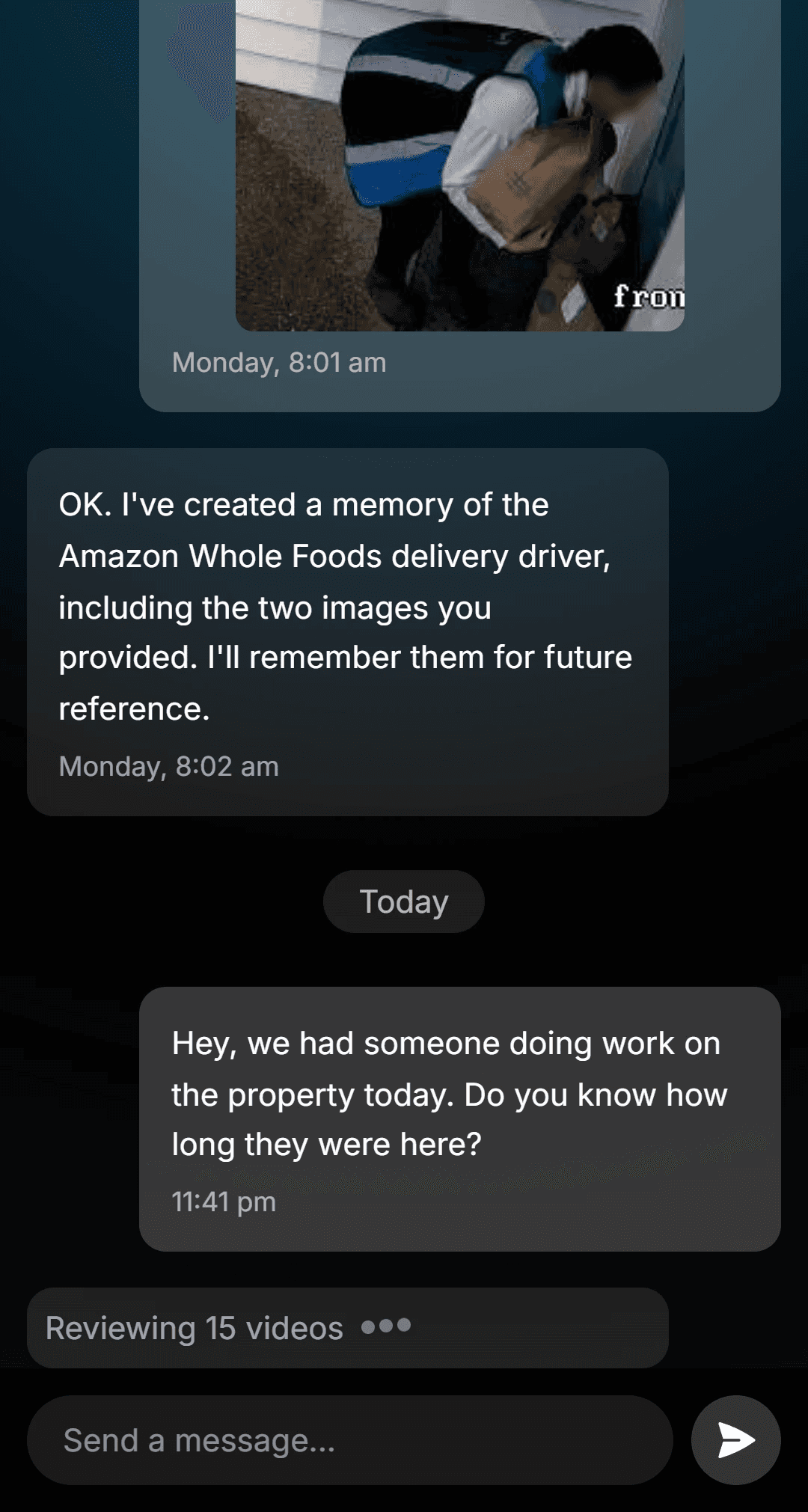No subscription required.
available anywhere
Plus, direct access to the team.
The team has spent the last 6 months tirelessly refining our product: finally, a home security system that's truly smart. We think you're going to love it.
But we're still far from perfection. That's why we're asking for your help, to be our partner in this journey, to give honest feedback about what we've gotten right and what we're missing.
If you sign up, expect an email from the founder, to learn about your use case and check that you’re a good fit for the private beta. If so, we’ll send you instructions on how to get set up, and how to join the community of other beta testers.
Our story, our values
from Dan, our founder
The idea
Blue Creek was born, like many ideas that are obvious in retrospect, from a confluence of seemingly unrelated events:
After a decade in the city, my family moved out to a home in the sticks. Somewhat unnerved by the isolation, we set up a litany of cameras to be alerted to everything from cougars to looky-loos. But I soon realized the unfeasibility of tuning the cameras well enough to get reliable notifications, and I resigned myself to accepting the system as a mere recording device.
In May 2024, I was randomly selected to be a juror in an armed burglary case affecting two separate victims. The victims both had security systems from leading companies, but neither had recordings of the events. By the end of the 3-week trial, I found myself wondering how the entire situation might have been avoided to begin with.
That same month, OpenAI announced their first multimodal (text and vision) large language model, gpt-4o, demoing to the public the ability of AI to converse with a user about what it sees. Like many others in the software world, I was blown away by the gravity of the moment and contemplated what applications this technology might finally unlock.
I quickly started tinkering. To my astonishment, gpt-4o was remarkably accurate at distinguishing known from unknown people on my security cameras. I wondered how hard it would really be to turn this into a production-ready product.
Building the kernel of a product
I began building out the kernel of the product, a collection of custom-tuned LLMs that would work in concert to analyze countless frames of video from my security cameras. The key challenges were scale, cost, security, and accuracy, and it took the majority of the summer to work through these problems and more.
By September 30, a major milestone: we had our first full 24 hours without a single false alarm—this, despite an array of 14 cameras, 5 with heavily obscuring spider webs, and more than 1,000 motion detection events processed through the night. The system, behind the scenes, had accurately understood the myriad distractions common in the night and intelligently filtered them out so we could sleep soundly.
Making it beautiful, making it useful
It was clear that what began as a pipeline of agents and a basic text interface was destined to become a business. We incorporated under a completely nonsensical name, "Toeeo, LLC," which we chose purely because (1) it has no meaning or connotation, (2) it's halfway pronounceable, and (3) it was available as a domain name. We eventually came upon the slightly better "Blue Creek" as our product name, which we felt evoked images of calmness, connection, and life. (The truth is we're still not happy with it, and we welcome better ideas.)
With the business off the ground, we got to work making a real product, built around these core principles, from the perspective of our customers:
We should feel it's always working on our behalf, rather than an app we need to check on.
We should be able to talk to it through text message, just like we would with a sitter, rather than having to search through videos.
We should be able to define behavior through conversation, not by how many features the developers can cram into the app.
We should be able to carry out the most critical tasks when we're under stress in no more than 2 clicks or a text message, not hunt through menus.
We should be able to afford the service for no more than a dinner for two per month.
What emerged from these principles is an app and a service that is both affordable and, we think, beautiful in its simplicity and ease of use.
The big moment
Having tested with a small group of team members up until now, we feel confident we're ready to release the product to a larger group of private testers. We do not feel confident we've worked out all the kinks. And even still, we're correcting misunderstandings from the AI that would be comical to any human.
But we know the best path to expanding Blue Creek's impact is not to privately tune it in perpetuity until it's perfect but to let you, the customer, put it through the paces.
Announcing the private beta is a big moment for us. We are a self-funded business built on little more than our experience and our passion for making smarter home security. So opening up access now means we're confident enough in the security, scalability, and usability of our product that enough of you will want to pay and stick with us through this journey. Only then can we be a profitable business.
Our values
You won't find corporate buzz-speak from us. We've modeled our operating philosophy around the great tech luminaries, Bill Hewlett and David Packard, and their commitment to honesty, excellence, and fiscal responsibility.
In the interest of transparency, we're sharing our internal values with you here. We think our customers deserve to know who they're getting into business with. We hope that will include you.
First: make money. We can’t empower every family with affordable security if we can’t turn a profit. That means we fund our next big thing only after the current thing becomes big. It also means we don’t push features we can’t support. R&D is core to our business’s success, of course, but we fund it only from the money we earned yesterday—not from what we expect to earn tomorrow.
Second: focus on one core idea. Then leverage that idea to build a family of products. Many companies fire shots in all different directions hoping one will hit. We won’t be those companies. It’s antithetical to our efficiency-first mindset. We’re committed to one idea; we have strong conviction in it; and it’s what we’ll drive. Our core idea is this: when intelligence becomes a commodity, advanced intelligence will become personal. We aim to build intelligent products that are personal to their core. We’re starting with one of the most personal and important applications: protecting your family. But we see a whole market opening up in the next few years as the cost of intelligence goes down around the domestication and personalization of other services historically reserved for governments and corporations.
Third: drive costs down. The cost of AI will keep falling for the foreseeable future. Like Costco, Amazon, and State Farm, we’ll differentiate ourselves from the competition not by hoarding the margin from these falling prices but by passing the savings on to our customers. No exceptions.
Fourth: make market share, don’t take it. We believe we’re making a new product category: personal intelligence. If we focus only on taking a share of an existing market, we set our sights too near. The world of personal intelligence is far bigger than a smarter camera, or better notifications: it will encompass every aspect of our lives. We aim to invent new markets in that world—not be limited by the state of play before AI. It also helps in our pursuit of all the above values that new markets are by their nature less crowded.
Fifth: be different. We’re (today) a small business in a sea of much bigger fish. Doing what the others are doing simply won’t work. We have to place bets on a new vision for personal intelligence, even when that means upending well-worn patterns. We have less resources than the big guys, but being different will be our edge. If we simply copy what others are doing, we’re toast. If we offer something truly different, we have a shot at making something truly great.






